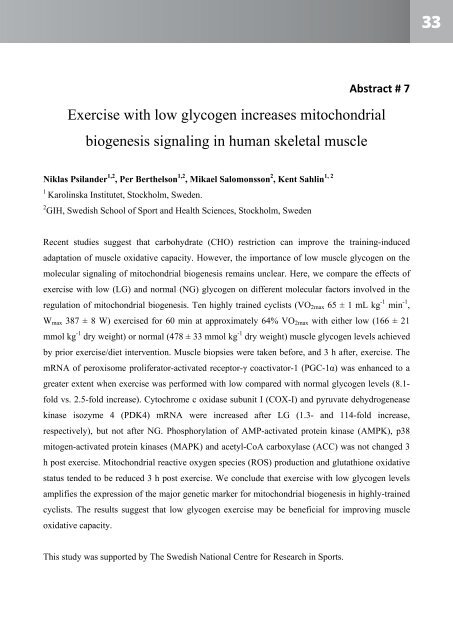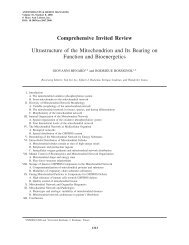MiPsummer Programme pdf - Mitochondrial Physiology Society
MiPsummer Programme pdf - Mitochondrial Physiology Society
MiPsummer Programme pdf - Mitochondrial Physiology Society
You also want an ePaper? Increase the reach of your titles
YUMPU automatically turns print PDFs into web optimized ePapers that Google loves.
33<br />
Abstract # 7<br />
Exercise with low glycogen increases mitochondrial<br />
biogenesis signaling in human skeletal muscle<br />
Niklas Psilander 1,2 , Per Berthelson 1,2 , Mikael Salomonsson 2 , Kent Sahlin 1, 2<br />
1<br />
Karolinska Institutet, Stockholm, Sweden.<br />
2 GIH, Swedish School of Sport and Health Sciences, Stockholm, Sweden<br />
Recent studies suggest that carbohydrate (CHO) restriction can improve the training-induced<br />
adaptation of muscle oxidative capacity. However, the importance of low muscle glycogen on the<br />
molecular signaling of mitochondrial biogenesis remains unclear. Here, we compare the effects of<br />
exercise with low (LG) and normal (NG) glycogen on different molecular factors involved in the<br />
regulation of mitochondrial biogenesis. Ten highly trained cyclists (VO 2max 65 ± 1 mL kg -1 min -1 ,<br />
W max 387 ± 8 W) exercised for 60 min at approximately 64% VO 2max with either low (166 ± 21<br />
mmol kg -1 dry weight) or normal (478 ± 33 mmol kg -1 dry weight) muscle glycogen levels achieved<br />
by prior exercise/diet intervention. Muscle biopsies were taken before, and 3 h after, exercise. The<br />
mRNA of peroxisome proliferator-activated receptor- coactivator-1 (PGC-1) was enhanced to a<br />
greater extent when exercise was performed with low compared with normal glycogen levels (8.1-<br />
fold vs. 2.5-fold increase). Cytochrome c oxidase subunit I (COX-I) and pyruvate dehydrogenease<br />
kinase isozyme 4 (PDK4) mRNA were increased after LG (1.3- and 114-fold increase,<br />
respectively), but not after NG. Phosphorylation of AMP-activated protein kinase (AMPK), p38<br />
mitogen-activated protein kinases (MAPK) and acetyl-CoA carboxylase (ACC) was not changed 3<br />
h post exercise. <strong>Mitochondrial</strong> reactive oxygen species (ROS) production and glutathione oxidative<br />
status tended to be reduced 3 h post exercise. We conclude that exercise with low glycogen levels<br />
amplifies the expression of the major genetic marker for mitochondrial biogenesis in highly-trained<br />
cyclists. The results suggest that low glycogen exercise may be beneficial for improving muscle<br />
oxidative capacity.<br />
This study was supported by The Swedish National Centre for Research in Sports.



